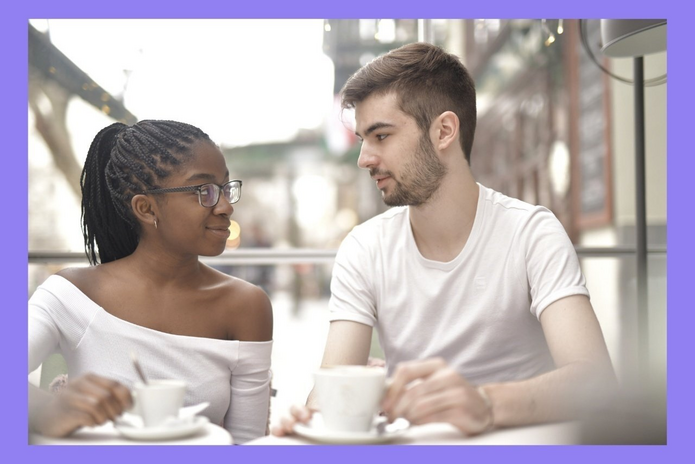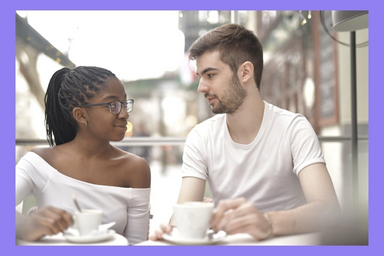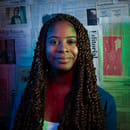In August, TikTok creator @juztjosh posted a video where he explained that preference for dating one race over another isn’t a “type,” but actually an example of sexual racism. As a Black woman, it was enlightening to finally hear, for the first time, another Black TikToker acknowledge that racial preferences are just racism in disguise.
I honestly just don’t understand it.
In recent months, TikTok videos where people explain how they only date a certain race — their “preference” or their “type” — have taken off as a trend. Yet, I’ve never quite understood how a race… could be someone’s type? I find nice smiles and tall heights attractive physical features that can belong to a person of any race. That’s my type — but race? I could never only date white men, when not all white men look the same. I could never automatically disqualify other races from my dating palette because I’ve never met every person from that racial group.
These ideas underscore the phenomenon of sexual racism, the romantic or sexualized attraction to people based on their race.
Defining experiences of sexual racism
Dating is hard for everyone — period. Any Gen Z college student will tell you that. In an era dominated by hook-up culture and online dating, it feels almost impossible to find a partner.
But, this challenge seems to be 10 times harder for me when I’m perceived as less desirable. Hearing potential partners say, “I only date white girls,” or “Black women are unattractive to me,” has shaped my dating life significantly.
I’ve been dating since I was 14 years old, and I’ve only managed to have two relationships, both of which expired in less than six months. Despite my attempts, steady relationship experiences remain few and far between. It makes me wonder if people find me attractive? On social media — and even sometimes in person — they make it clear that I’m not their “type.” My blackness isn’t on the list of characteristics they’re looking for in a partner.
Jilly Townson, a marketing major at Emerson College, also feels romantic rejection as a racial minority. “It’s hard, feeling like the last choice. At least for me, I feel like Black girls aren’t prioritized,” she says.
The amount of times I’ve seen people exclude Black folks from their dating profile because we don’t fit their “type” is staggering. However, I never was able to articulate how someone can exclude a racial group romantically until I learned of sexual racism. According to Rewire, sexual racism explains why men or women romantically prefer certain races and skin color over others.
“Sexual racism has always been around, but TikTok and Twitter give sexual racists – and racists in general – platforms to spread their heinousness,” Eryn McCallum, a journalism major at Emerson College, explains. “It made me stop wanting to open apps out of fear of seeing something that would make me feel like crap.”

Sexual racism on college campuses
Students say that sexual racism is more prevalent on college campuses, especially at predominantly white institutions, where dating is exclusionary.
“Going to a predominantly white institution makes it harder to date within your race [if you are a minority]. When I do decide to date out of my race, one of the first thoughts I have is: does this person like Black girls?” Townson says.
Every time I go to a party or a school event, I never feel as if I’m desired or someone wants to talk to me. This feeling isn’t reserved only for me, but also for McCallum too.
“In my own experiences with entering the dating scene at a [predominantly white institution] and going to any parties where the people are mostly white, I can definitely tell that I’m the last girl anyone wants to talk to,” she says.
In my three year attendance at Emerson College, a predominantly white school, I’ve never gone on a date with anyone from my college. No matter how many times I put myself out there (going to sports events, attending poetry slams, or going to basketball parties), I notice a difference in male interest generated toward me compared with interest for my best friend, a white-passing Latinx woman.
When I first arrived my freshman year, I attended our college’s Black student organization where I was anecdotally told that the Black male population — an already small handful of students — dated only white women. The Black upperclassmen echoed this sentiment, claiming that the Black women on-campus were not attractive. Hearing this my first year seriously influenced my self-confidence and my perception of my beauty.
No longer did I think my Blackness was attractive. I used to cry, wishing I could lighten my skin or straighten my curly hair. While internal and external beauty should not be connected to the amount of people who find me attractive, I couldn’t help thinking that something was wrong with me if no one found me desirable.
Sexual racism impacted me so heavily that I began to question my Black suitor’s intentions. Thoughts like, “Are you into Black women?” and “What do you find attractive about me?” were often running through my head every time a person showed interested in me. And when I went on a date with a white guy, I wondered if they were sexualising or fetishzing me — another example of sexual racism.
Freeing yourself from sexual racism
Sexual racism inhibited me from finding myself attractive. No longer did I see the beauty in my blackness, until I saw TikToker @juztjosh’s video on the myth of racial preferences.
It was the first time I saw a Black man stick up for Black women, and claim that these racial preferences were derivative of racism and stereotypes. The video struck an awakening in me and helped me understand that my self-confidence isn’t tied to people’s racist perception of beauty. The majority of the reasons why some decide not to date Black people is because of their internal biases.
“The stereotypes and biases surrounding Black womanhood are surely reinforced by sexual racism,” Townson says. “It allows society to view us solely by these conventions, and not as individuals. When people don’t view you as you, then how can they truly love you for who you are?”
Until every single person starts seeing identity, sexual racism will only continue to unfold in the dating scene and tear down sense of self. My individuality as a Black woman should not be overshadowed by an old-age characterization that is ignorant and prejudice. Until you see me for me instead of a label, you’ll never see my beauty.
“At the end of the day, I just want Black women to realize their power and not allow anyone to make them feel like they aren’t worthy of love or aren’t beautiful or sexy,” McCallum says.


